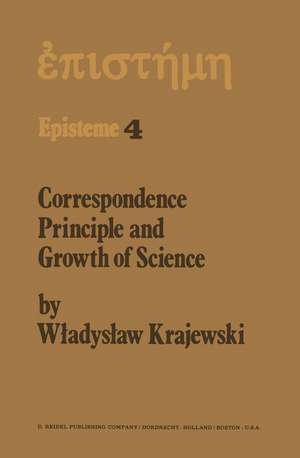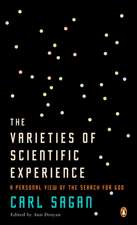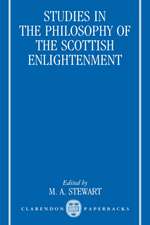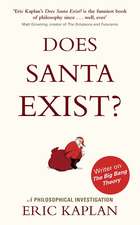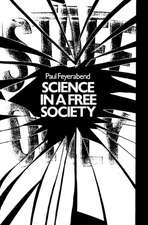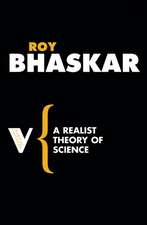Correspondence Principle and Growth of Science: Episteme, cartea 4
Autor W. Krajewskien Limba Engleză Paperback – 14 oct 2011
Din seria Episteme
- 20%
 Preț: 306.88 lei
Preț: 306.88 lei - 18%
 Preț: 951.91 lei
Preț: 951.91 lei - 15%
 Preț: 647.08 lei
Preț: 647.08 lei - 15%
 Preț: 640.71 lei
Preț: 640.71 lei -
 Preț: 395.63 lei
Preț: 395.63 lei - 20%
 Preț: 993.42 lei
Preț: 993.42 lei - 18%
 Preț: 939.28 lei
Preț: 939.28 lei -
 Preț: 398.92 lei
Preț: 398.92 lei - 15%
 Preț: 644.30 lei
Preț: 644.30 lei - 15%
 Preț: 644.63 lei
Preț: 644.63 lei - 18%
 Preț: 953.20 lei
Preț: 953.20 lei - 20%
 Preț: 553.11 lei
Preț: 553.11 lei - 18%
 Preț: 894.46 lei
Preț: 894.46 lei - 15%
 Preț: 651.67 lei
Preț: 651.67 lei - 18%
 Preț: 954.62 lei
Preț: 954.62 lei - 15%
 Preț: 643.99 lei
Preț: 643.99 lei - 20%
 Preț: 328.79 lei
Preț: 328.79 lei -
 Preț: 388.90 lei
Preț: 388.90 lei - 15%
 Preț: 654.12 lei
Preț: 654.12 lei - 18%
 Preț: 1231.64 lei
Preț: 1231.64 lei -
 Preț: 387.38 lei
Preț: 387.38 lei -
 Preț: 380.45 lei
Preț: 380.45 lei -
 Preț: 388.90 lei
Preț: 388.90 lei - 18%
 Preț: 948.79 lei
Preț: 948.79 lei
Preț: 380.25 lei
Nou
Puncte Express: 570
Preț estimativ în valută:
72.76€ • 75.82$ • 60.25£
72.76€ • 75.82$ • 60.25£
Carte tipărită la comandă
Livrare economică 03-17 aprilie
Preluare comenzi: 021 569.72.76
Specificații
ISBN-13: 9789401011808
ISBN-10: 940101180X
Pagini: 156
Ilustrații: XIV, 138 p.
Dimensiuni: 155 x 235 x 8 mm
Greutate: 0.23 kg
Ediția:Softcover reprint of the original 1st ed. 1977
Editura: SPRINGER NETHERLANDS
Colecția Springer
Seria Episteme
Locul publicării:Dordrecht, Netherlands
ISBN-10: 940101180X
Pagini: 156
Ilustrații: XIV, 138 p.
Dimensiuni: 155 x 235 x 8 mm
Greutate: 0.23 kg
Ediția:Softcover reprint of the original 1st ed. 1977
Editura: SPRINGER NETHERLANDS
Colecția Springer
Seria Episteme
Locul publicării:Dordrecht, Netherlands
Public țintă
ResearchCuprins
1. Correspondence Principle.- 1.1. Bohr’s Principle.- 1.2. The Attitude of Philosophers.- 1.3. A General Methodological Principle in Physics.- 1.4. Descriptive and Normative Versions.- 1.5. Some Logical Difficulties.- Notes to Chapter 1.- 2. Idealization and Factualization.- 2.1. Scientific Law an an Implication.- 2.2. Factual and Idealizational Laws.- 2.3. Idealization in Science.- 2.4. The Attitude of Philosophers.- 2.5. Idealization and Factualization.- 2.6. Idealization and Essence.- 2.7. Some Controversial Issues.- Notes to Chapter 2.- 3. Reduction.- 3.1. The Concept of Reduction.- 3.2. Heterogeneous Reduction.- 3.3. Non-Mechanistic Reductionism.- 3.4. Trivial Homogeneous Reduction.- 3.5. Non-Trivial Homogeneous Reduction.- 3.6. Reduction of an Idealizational Law to a Factual One.- Notes to Chapter 3.- 4. Correspondence Relation.- 4.1. Definition.- 4.2. Simple Implicative Version.- 4.3. Approximative Version.- 4.4. Explanative Version.- 4.5. ‘Dialectical’ Version.- 4.6. Renewed Implicative Version.- 4.7. Some Formal Features.- 4.8. Correspondence Sequence and Correspondence Network.- Notes to Chapter 4.- 5. The Problem of the Incommensurability and Relations Among Theories.- 5.1. The Claim of Incommensurability.- 5.2. The Problem of Meaning Variance.- 5.3. The Problem of ‘Untranslatable’ Languages.- 5.4. The Problem of the ‘Theory-Ladenness’ of Facts.- 5.5. Various Relations Among Theories.- Notes to Chapter 5.- 6. The Types of Methodological Empiricism.- 6.1. Inductivism.- 6.2. Hypothetism.- 6.3. Pluralistic Hypothetism.- 6.4. Idealizational Hypothetism.- 6.5. Pluralistic Idealizational Hypothetism.- 6.6. A Confrontation: the Diversity of Methods.- Notes to Chapter 6.- 7. Revolutions and Continuity.- 7.1. Simple Cumulativism (No Revolutions or OneRevolution).- 7.2. Simple Anticumulativism (Permanent Revolution or Occasional Revolutions Without Continuity).- 7.3. A Dialectical View (Revolutions and Continuity).- 7.4. The Threshold of Maturity (Two Kinds of Revolutions).- 7.5. Periods of Evolution and of Revolution.- 7.6. The Concept of Revolution and Anti-Cumulative Changes.- Notes to Chapter 7.- 8. Relative and Absolute Truth.- 8.1. Relative Truth.- 8.2. Absolute Truths in Science.- 8.3. Truth-Content and Approximate Truth.- 8.4. The Truth of Idealizational Laws and of Their Factualizations.- 8.5. Relative Truth and Essence.- 8.6. Towards the Absolute Truth.- Notes to Chapter 8.- 9. Internal and External History of Science.- 9.1. Internal and External Factors.- 9.2. The Problem of the Methodological Historicism.- 9.3. Internal History as an Idealization.- Notes to Chapter 9.- Index of Names.
